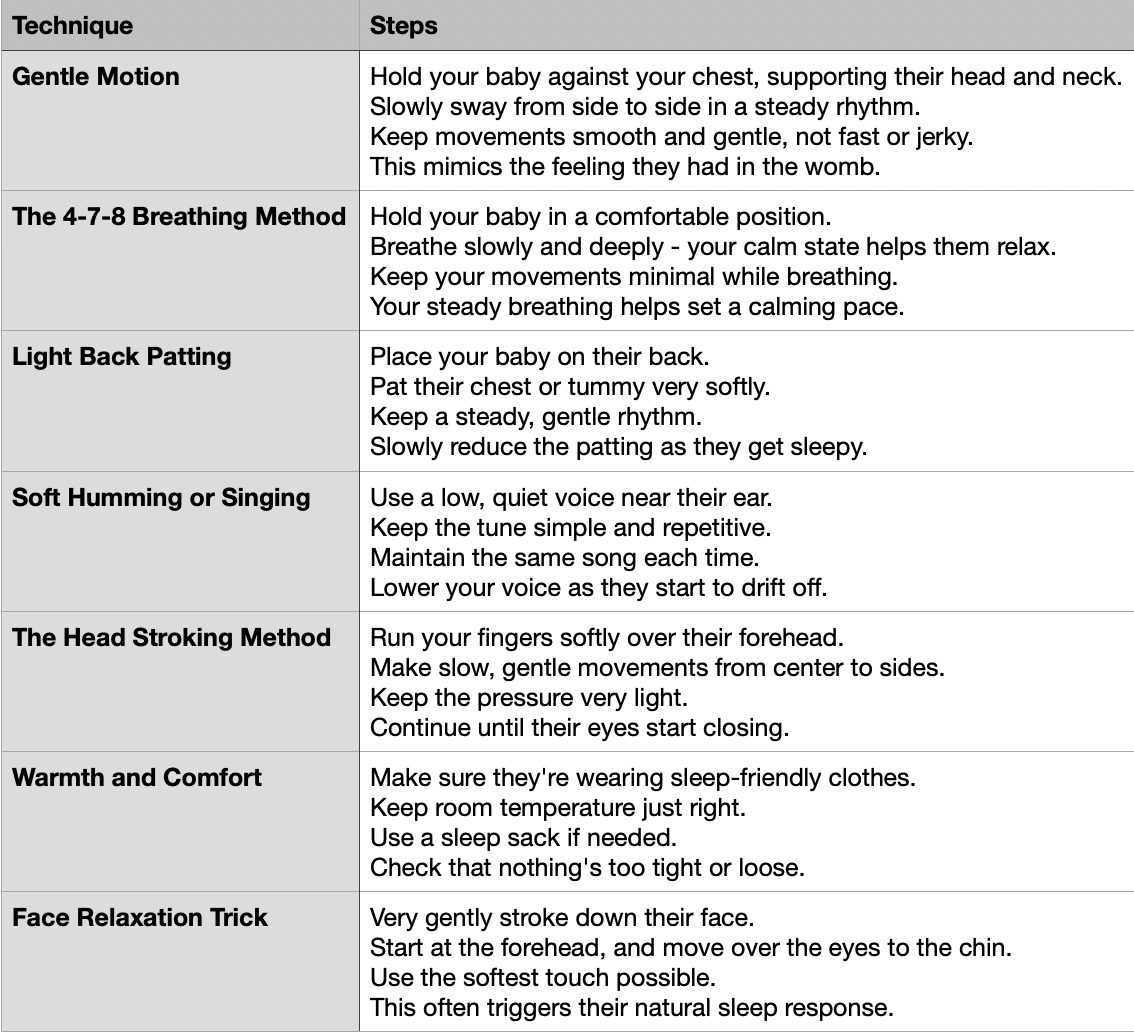We know what it’s like to watch your baby fight sleep. Our little ones would rub their eyes and yawn every night but still refuse to drift off.
It’s a common problem that many parents face, and it can be quite tiring. Getting your baby to sleep doesn’t have to feel like an uphill battle.
The good news is that babies aren’t fighting sleep just to test our patience – there are real reasons behind this behavior.
When you understand these reasons, you can help your little one rest better.
In this post, we’ll share what we’ve learned about why babies resist sleep and explain the main causes that lead to this tricky situation.
Plus, you’ll find out what you can do to make bedtime smoother for both you and your baby.
Common Reasons for Babies Fighting Sleep
1. Short on Sleep Time
When babies stay awake too long, they get overly tired. Think of it like missing your usual bedtime – it gets harder to fall asleep, not easier. We’ve seen this happen many times.
When babies go past their ideal sleep window, their bodies make stress hormones that keep them alert and fussy.
2. Not Tired Enough
Sometimes, babies fight sleep because they aren’t tired. If nap times are too close together or they haven’t had enough active playtime, they won’t feel ready for rest.
Like adults, babies need to use up their energy during the day to sleep well.
3. Hunger Pangs
A hungry baby won’t settle easily for sleep. Their tiny tummies digest milk quickly, and they need frequent feeds.
When a baby is hungry, their natural instinct to eat will override their need for sleep. Before bedtime, make sure your little one has had a good feed.
4. Room Temperature Issues
Babies sleep best in a room that’s not too hot or cold. They’ll let you know if they’re too warm or chilly by being fussy. We always check to ensure the room feels comfortable – not stuffy or drafty.
The right temperature helps babies drift off naturally.
5. Noise Level Problems
Some babies need quiet to sleep, while others like background noise. Too much silence or sudden loud sounds can keep them alert.
Finding the right noise level for your baby takes time, but it makes a big difference in how well they sleep.
6. Physical Discomfort
A wet diaper, tight clothing, or scratchy tags can all make babies fight sleep. They might also be teething or have gas pains.
Before bedtime, we check for any physical issues that might bother them during sleep time.
7. Schedule Changes
Babies always depend on the routine. They often resist sleep when their schedule changes due to travel, visitors, or other events.
Their internal clock gets confused, making it harder to recognize sleep time.
8. Growth Spurts
During growth spurts, babies often fight sleep even when tired. Their bodies are working hard to grow, which can make them feel uncomfortable or extra hungry.
These phases pass, but they can disrupt sleep patterns temporarily.
9. Separation Anxiety
Around 6-8 months, many babies develop separation anxiety. This can make them fight sleep because they don’t want to be away from their parents.
They need extra comfort and reassurance during this normal phase of development.
10. Too Much Stimulation
Bright lights, exciting play, or screens before bedtime can make it hard for babies to calm down. Their brains need time to switch from active mode to sleep mode.
A calm, quiet, wind-down routine helps prepare them for rest.
Why Do Newborn Babies Fight Sleep
Physical Development
- A newborn’s brain is still learning how to organize sleep patterns. Their sleep cycle runs in short bursts of 2-4 hours.
- Their tiny bodies haven’t yet set up a day-night pattern, which makes regular sleep hard at first.
- During the first weeks, babies often mix up days and nights because they’re used to the dark environment of the womb.
Feeding Needs
- Newborns have very small stomachs that empty quickly, leading to frequent hunger.
- They must eat every 2-3 hours, which naturally interrupts their sleep.
- The feeling of hunger is new to them, and they often wake up because of it, even when tired.
New Sensations
- Every sound, light, and touch is fresh to a newborn baby.
- Their senses are working overtime to take in the world around them.
- Simple things like clothing tags or slight temperature changes feel strong.
Missing the Womb
- The outside world differs greatly from the snug, warm womb they knew.
- They miss the constant movement and sounds they felt before birth.
- Getting used to lying still in a crib takes time for many newborns.
Overtiredness
- When newborns stay awake too long, their bodies make stress hormones.
- These hormones can keep them alert even when they need sleep.
- This creates a cycle where being tired makes it harder to fall asleep.
Learning to Self-Soothe
- Newborns don’t know how to calm themselves down yet.
- They need help settling when they’re tired or upset.
- The skills for falling asleep on their come later, around 3-4 months.
Digestive System Development
- New babies often have gas or tummy discomfort as their digestive system matures.
- They might fight sleep because of these uncomfortable feelings.
- It takes time for their bodies to get used to feeding and digesting.
Light and Dark Adjustment
- Newborns are still learning to tell day from night.
- Their internal clock (circadian rhythm) isn’t set yet.
- This makes it hard for them to follow regular sleep patterns at first.
What to Do When a Baby is Fighting Sleep
Create a Bedtime Pattern
- Pick 3-4 calm activities to do before sleep, like a warm bath, soft music, or reading.
- Do these same things every night; babies feel safe when they know what’s coming next.
- Keep the routine short, about 20-30 minutes, so your baby doesn’t get too tired.
Watch Sleep Signs
- Look for signs like eye rubbing, ear pulling, or becoming quiet.
- Put your baby to bed when you see these signs – don’t wait until they’re too tired.
- Each baby shows different tired signs – learn what your baby does.
Make the Room Sleep-Ready
- Keep the room dark using curtains or blinds.
- Use a night light if needed – make sure it’s not too bright.
- Set a good room temperature – not too hot or cold.
- Remove noisy toys or things that might catch their attention.
Try White Noise
- Use a fan or white noise machine to block sudden sounds.
- Keep the sound at a low, steady level.
- Place it away from the crib for safety.
Check for Basic Needs
- Make sure your baby isn’t hungry before sleep time.
- Change their diaper so they’re clean and dry.
- Check that their clothes aren’t too tight or loose.
- Feel their skin to make sure they’re not too hot or cold.
Give Extra Comfort
- Hold your baby close if they need it.
- Pat their back gently to help them feel secure.
- Speak in soft, quiet tones to calm them.
- Stay near them until they feel settled.
Set Good Sleep Times
- Put your baby to bed at the same times each day.
- Plan naps based on when they usually get tired.
- Don’t skip naps – tired babies have trouble sleeping.
Make Daytime Active
- Let your baby move and play during the day.
- Take them outside for some natural light.
- Keep day feeds bright and chatty.
- Make night feeds quiet and calm.
Be Patient with Changes
- Stick to your chosen method for at least a week.
- Small steps forward are still good progress.
- Remember that every baby is different.
- What works for one baby might not work for another.
Ask for Help
- Take turns with your partner for night duties.
- Let family help when you need rest.
- Talk to other parents about what worked for them.
- Speak to your doctor if you’re worried about sleep issues.
How to Make Baby Sleep in Seconds
Conclusion
We understand your baby’s sleep is precious – both for them and for you!
Throughout this guide, we’ve shared what we know about why babies fight sleep and how to help them rest better.
Remember, no two babies are the same, and what works for one might not work for another.
If you’re worried about your baby’s sleep, talking to your pediatrician can help. They can check for any underlying issues and offer personalized advice for your little one.
Sweet dreams to you and your baby!













